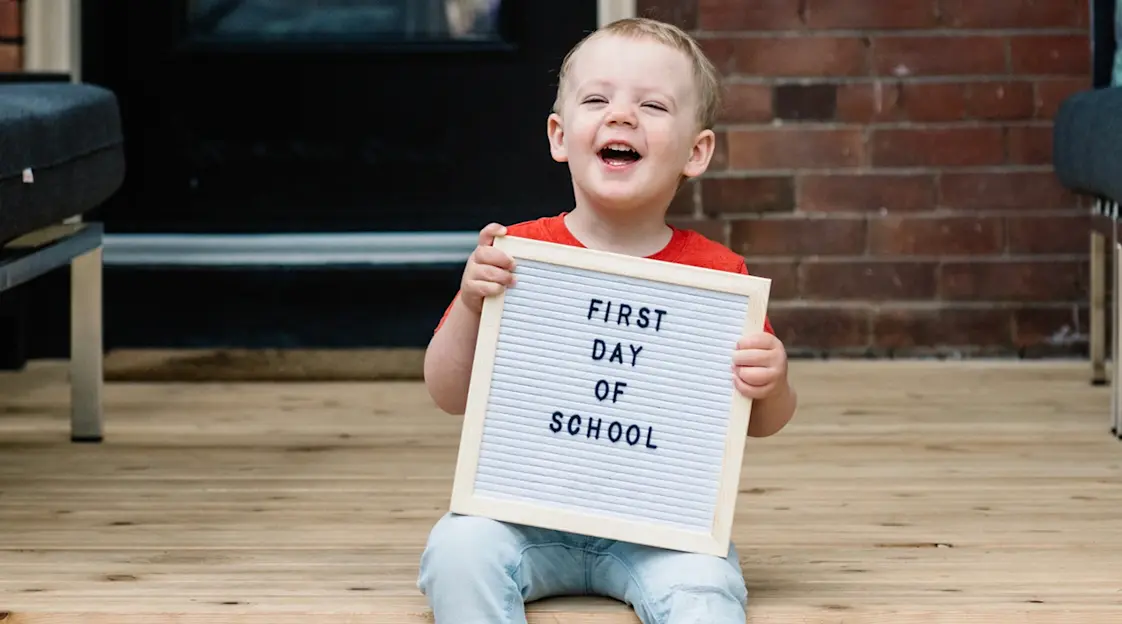
It’s hard for parents to send little ones off to their first day of preschool. There are usually a few happy tears (and maybe a few sad ones, too), a thousand photos, and a big leap into a brand-new routine. But if it’s hard for you, imagine how much scarier it can be for your child.
While you’ll undoubtedly spend time picking out adorable first-day outfits and stocking up on school supplies, it’s equally important to prepare your child mentally and emotionally for this big transition. These seven tips will help set them up for success — and help you both feel more confident when the big day arrives.
1. Make Sure They’re Comfortable Going Potty
For many preschoolers, one of the most intimidating parts of school isn’t meeting new friends — it’s using the bathroom! Regular-sized toilets, automatic flushers, and new surroundings can feel overwhelming.
In the weeks leading up to school, take your child to public restrooms so they get used to using facilities outside your home. Encourage them to flush, wash their hands, and navigate on their own as much as possible. If they’re nervous, reassure them that lots of kids feel the same way and that their teacher will be there to help if needed.
2. Practice Sharing and Taking Turns
If your child has older siblings, they’ve probably learned a thing or two about sharing. But if they’re your first or only child, you may need to help them practice these skills before preschool starts.
Arrange a few playdates, visit the local park, or join a library storytime. Look for opportunities to encourage sharing, taking turns, and working together. That way, when your child arrives at school, these skills will feel familiar, and they’ll have an easier time making friends.
3. Talk About School Early and Often
Children thrive on routine, but preschool is a whole new one. Talking about what’s coming up can make it feel less mysterious and more exciting.
Read books about starting school, such as The Day You Begin by Jacqueline Woodson or Llama Llama Misses Mama by Anna Dewdney. Tell stories about what their day might look like, from morning drop-off to playtime to pickup. The earlier you start these conversations, the more comfortable your child will feel.
4. Meet the Teacher Together
Most preschools offer an open house or meet-the-teacher day before school starts. Take advantage of it! Meeting their teacher while you’re by their side can help your child feel safe and supported.
This is also a great time to share any important information with the teacher — like allergies, comfort items, or personality quirks — so they can be ready to help your child thrive.
5. Explore the School Before the First Day
Once you’ve met the teacher, take a short tour together. Show your child the playground, the classroom, the cubbies where they’ll put their backpack, and any fun activity stations.
Point out things they can look forward to: “This is where you’ll paint!” or “Look, there’s a play kitchen!” Your excitement will help them feel excited, too.
6. Practice Quiet Time
Your child may have outgrown naps, but many preschools still offer a quiet time during the day. If your child isn’t used to slowing down mid-day, start practicing at home.
Give them 15–20 minutes to rest quietly, look at picture books, or do a calm activity without screens. This will make the transition easier — and help prevent the “I’m bored!” complaints that sometimes pop up during those moments at school.
7. Acknowledge Their Feelings (and Yours!)
It’s entirely normal for your child to feel a little sad, nervous, or anxious about starting school — and it’s normal for you to feel that way too. Let them know it’s okay to have these emotions and that they can always talk to you about them.
Offer reassurance, but also remind them that school will soon feel familiar. And don’t be surprised if, after a week or two, they’re so comfortable they don’t want to leave when you arrive for pickup. (And yes, they might even get disappointed when the weekend comes and there’s no school!)
The Bottom Line
Preschool is a big step — one that’s as much about emotional growth as it is about learning ABCs and 123s. By preparing ahead of time, you’re giving your child the tools to walk into that first day with confidence, curiosity, and maybe even a big smile.
